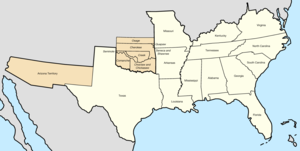| Tennessee | |
|---|---|
| Nickname(s): The Volunteer State | |
 Map of the Confederate States | |
| Capital | Nashville |
| Largest city | Memphis |
| Admitted to the Confederacy | July 2, 1861 (11th) |
| Population |
|
| Forces supplied | |
| Governor | Isham G. Harris (1861–1862) |
| Senators | Landon Carter Haynes Gustavus Adolphus Henry |
| Representatives | List |
| Restored to the Union | July 24, 1866 |
| History of Tennessee |
|---|
 |
|
|
|
 |
|
Confederate States in the American Civil War |
|---|
|
|
| Dual governments |
| Territory |
|
Allied tribes in Indian Territory |
The American Civil War significantly affected Tennessee, with every county witnessing combat. During the War, Tennessee was a Confederate state, and the last state to officially secede from the Union to join the Confederacy. Tennessee had been threatening to secede since before the Confederacy was even formed, but didn’t officially do so until after the fall of Fort Sumter when public opinion throughout the state drastically shifted. Tennessee seceded in protest to President Lincoln's April 15 Proclamation calling forth 75,000 members of state militias to suppress the rebellion.[4] Although Tennessee provided a large number of troops for the Confederacy, it would also provide more soldiers for the Union Army than any other state within the Confederacy.
In February 1862, some of the war's first serious fighting took place along the Tennessee and Cumberland rivers, recognized as major military highways, and mountain passes such as Cumberland Gap were keenly competed-for by both sides. The Battle of Shiloh and the fighting along the Mississippi brought glory to the then little-known Ulysses S. Grant, while his area commander Henry Halleck was rewarded with a promotion to General-in-Chief. The Tullahoma campaign, led by William Rosecrans, drove the Confederates from Middle Tennessee so quickly that they did not take many casualties, and were strong enough to defeat Rosecrans soon afterward. At Nashville in December 1864, George Thomas routed the Army of Tennessee under John Bell Hood, the last major battle fought in the state.
In 1862, Lincoln chose to use his power as commander in chief to appoint Andrew Johnson as the military governor of Tennessee.[5] Two years later, Lincoln selected him as a Southerner to balance the ticket in the 1864 general election. On Lincoln's assassination, Johnson was sworn in as president.
Cite error: There are <ref group=lower-alpha> tags or {{efn}} templates on this page, but the references will not show without a {{reflist|group=lower-alpha}} template or {{notelist}} template (see the help page).
- ^ Tennessee: Third Addition. Retrieved January 31, 2021.
- ^ Tennessee Encyclopedia: Civil War. Retrieved January 29, 2021.
- ^ Lovett, Bobby L. Blacks In The Union Army Of Tennessee (1861-1866). tnstate.edu. Retrieved January 29, 2021.
- ^ "The Civil War: The Senate's Story". United States Senate.
- ^ Gordon-Reed, pp. 69–70.
© MMXXIII Rich X Search. We shall prevail. All rights reserved. Rich X Search


